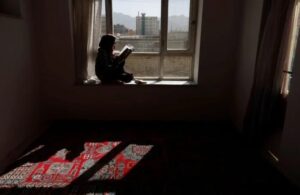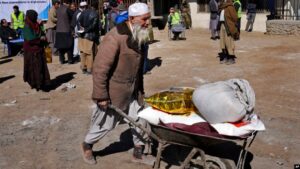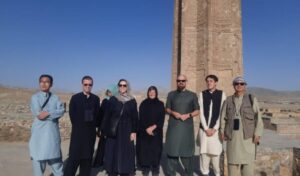KABUL (SW) – Filling the information void, Salam Watandar has managed to pull at least 42 exclusive investigative reports to expose atrocities faced by women and girls, and documents their plight amid the ongoing upheavals in the country.
Statement
In the heart of Asia, Afghanistan has gone transformative political and military changes over the past many decades that have severely impacted lives of the people with women and girls bearing the brunt of the hardships coming with these changes.
Having a deeper look at these events of the past, can see that women were at the core of various concepts involved in the formation of political systems and changes in Afghanistan.
After many decades of oppression, particularly after 5 years of deprivation of the most basic human rights, a window of freedom was opened for women in Afghanistan in 2001 that helped women flourish at different levels. This changed again with another political upheaval on August 15, 2021 and the fate of women changed again. This was transformation in complete contradiction with the achievements of women in the previous twenty years.
After these new developments, Afghan women got systematically removed from different parts of society with their most basic rights snatched and prohibitions and restrictions imposed till date while the rights institutions reporting the atrocities.
To play its vital role as messenger and fill the information gap, Salam Afghanistan Media Organization (SAMO) has prepared and published a series of research reports to investigate the situation of women after the recent developments. It has so far published 42 such reports.
As per these reports, the status of women in different layers of social life has been investigated after the recent political transformation, and the results are drawn.
Background
After the change of regime in Afghanistan, women and their status have always been the subject of discussion at the political meetings internationally as well as a set of restrictions and exclusions got enforced upon them.
At the same time, apart from the fact that many of aid institutions supporting and reporting on the status of women have gradually disappeared, and most news agencies and news outlets have also not extensively covered women’s issues on a case-by-case basis. Due to this large gap, Salam Watandar has launched a series of research reports on the status of women. At least 42 such reports have been published so far.
Through these reports, 1,708 women were contacted in a period of 9 months through direct conversations, distribution of questionnaires and telephone calls.
Salam Watandar has published 39 descriptive research reports and 3 evaluation articles with analysis over a period of 9 months. 30 women were directly interviewed in each research report and an average of 347 women participated in each survey. Overall, Salam Watandar has interviewed with 666 women in person to prepare descriptive-research reports
Outlook on the economic status of women
Salam Watandar has spoken with a total of 666 women from different aspects of life to investigate the economic conditions of women. This way, it was found that the economic status of 402 women, which is 60% of the interviewees, got worsened after the implementation of strict restrictions.
Among those interviewed included 16 female military personnel, 18 women dismissed from various governmental departments, 14 female teachers in kindergartens, 26 women advocates, and 17 female journalists, 21 women who worked in various other active fields for women, 21 female artists, 24 female make-up artists, 20 female athletes, 30 women who are seeking work permits in various sectors, 17 professional businesswomen, 26 women who wanted to work, 76 widows, 21 saleswomen and 22 female child laborers. They all said to be facing grim circumstances since the political changes.
Work ban and its challenges for working women
Salam Watandar has prepared 17 research reports about women’s work. Some 9 reports were on working women and 8 reports on women who have lost their jobs. According to these reports, the work environment for women has been made difficult due to the restrictions and conditions applied to them.
The health sector, education, trade, industry, media and several governmental sectors are some active sectors for women. But in general, women are prohibited from working in governmental and non-governmental offices, even make-up and sports.
By preparing and publishing 17 research reports, Salam Watandar has discussed with 255 working women and 130 unemployed women their situation.
Among them included 24 female make-up artists, 16 female military personnel, 18 women dismissed from various governmental departments, 26 female defense lawyers, 12 women who lost their jobs in various fields, 17 female journalists, 20 female athletes, 14 female teachers in kindergartens who were got excluded from jobs and are now struggling with unemployment.
Salam Watandar also spoke with 22 child labor girls, 21 women rights workers, 21 female artists, 30 women who wanted to obtain a work permit, 23 businesswomen, 21 female paddlers, 17 midwives, 30 women who started working in the sewing sector and 23 women who have started working despite the challenges in the country. Findings of the researchs showed the business relations have increased for these women.
Violence against women
Violence against women is a phenomenon that has a cultural and social background in Afghanistan. It has become a regular phenomenon in Afghanistan, and sometimes women also contribute to the continuation of violence with self-censorship and silence rooted in social norms.
Salam Watandar launched two public surveys and a public survey of the statistics of women’s murders to investigate the situation of violence against women, the results of which show an unprecedented growth of violence against women.
Salam Watandar has investigated the situation of 911 women, of which 767 women, which constitute 84% of the surveyed women, have faced various types of violence. Of these women, 173 were killed, 343 faced violence inflicted by women, and 251 faced violence from various people.
Situation of girls after banning their education
Salam Watandar also prepared a survey and a descriptive research report on women’s and girls’ education in which 330 people were interviewed.
Among these, the fate of 307 female students was evaluated after the closure of universities. Similarly, the mental condition of 23 female students who completed the sixth grade this year was investigated. The findings of these two reports unearth psychological challenges of these girls. 95% of the girls participating in the Salam Watandar’s survey said that they intend to migrate abroad if the schooling is provided outside of Afghanistan.
Status of women’s access to legal services
Salam Watandar has published 21 research reports on women’s rights, in which the status and fate of 777 women have been examined.
In these reports, the status and fate of 24 female make-up artists, 22 female child laborers, 307 female students, 16 former military personnel, 18 female employees dismissed from various governmental offices, 6 women who do not have the right to custody of their children, 30 women from health department 26 women advocates, 4 women who were underage and faced forced marriages, 19 divorced women, 20 women athletes, 30 women who want to obtain a work permit in sectors where women’s activities are not prohibited, 17 women who have the right to inheritance, 30 women who have been deprived of their right to mahr, 23 girls who finished the sixth grade, 5 women who have cases in the Supreme Court, and 18 female cinemagoers have been examined.
Salam Watandar has also examined the situation of safe houses, the issues of women’s access to justice and legal services, and 173 cases of murder and suicide of women. These findings show that women’s access to work, justice and legal services has decreased.
Mental and psychological challenges
Salam Watandar has prepared and published 8 research reports to investigate the psychological condition of women.
In these reports, 18 female cinematographers, 20 female athletes, 16 women who have faced mental challenges, 13 female make-up artists, 26 female defense lawyers and 13 female military personnel have talked about their mental illnesses.
It was also revealed that 91.2% of 412 women who have been subjected to violence by other women have faced mental and emotional problems, and 52% of 312 women who have faced all kinds of violence have also faced mental and emotional disorders.
Social sphere for women
Salam Watandar has prepared and published 6 investigative reports in this regard, in which the status of 853 women has been examined. In the social sphere, 30 women spoke about their right to mahr, 17 women said they did not receive their right to inheritance, 30 girls said they were subjected to gender discrimination at home, 18 women said their husbands were polygamous while 19 divorced women, 412 women who have been subjected to violence by other women, and 327 women who have faced all kinds of violence in society have been interviewed. Based on these findings, women are deprived of their basic rights in the home environment as well.
It should be noted that the restrictions in various parts of women’s lives continue while the international community has always demanded its elimination by the de-facto government.
Recommendations
In order to respect the dignity of women and to prove their place as half and important part of the society, the de-facto government has the responsibility to take serious measures in this direction and to give women the most basic rights, which are the right to education and work. Some actions that can be taken in this direction are as follows
1. According to the statistics and results obtained from 40 investigate reports, it is suggested for the de-facto government to open the gates of schools and universities to girls with a specific strategy and accepted structure.
2. The de-facto government is asked to remove the ban on women working in various fields. Women with their creative ideas and professional abilities can make a valuable contribution to the development.
3. The results of Salam Watandar’s surveys show the unfavorable mental and emotional condition of women, so the de-facto government should end the restrictions to prevent the isolation of women on humanitarian basis.
4. Salam Watandar calls on all civil and media institutions of the country to act as influential and society building channels to chalk long-term strategies in line with women’s access to the fundamental rights of responsible citizenship.
5. Salam Afghanistan Media Organization (Radio Salam Watandar) requests researchers, academic and media organizations to conduct social research, especially about women, from time to time and reveal the challenges and concerns of women to attract the attention of relevant authorities to solve these challenges.
ENDS






